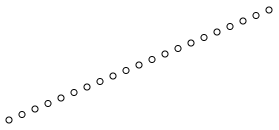elm-1d-parameter
elm-1d-parameter is an Elm package to help with
generating evenly spaced values such as (but not limited to) Floats,
Colors, Quantitys, or Point2ds.
The core idea is that there are many functions that let you interpolate between
two values based on a parameter value that ranges from 0 to 1; 0 gives you the
first value, 1 gives you the second value, 0.5 gives you a value half way in
between, etc. Some examples from elm-float-extra, elm-color-extra,
elm-units and elm-geometry that work this way:
Float.Extra.interpolateFrom :
Float -- first value
-> Float -- second value
-> Float -- interpolation parameter
-> Float
Color.Interpolate.interpolate :
Space -- what color space to interpolate in (e.g. HSL)
-> Color -- first color
-> Color -- second color
-> Float -- interpolation parameter
-> Color
Quantity.interpolateFrom :
Quantity Float units
-> Quantity Float units
-> Float
-> Quantity Float units
Point2d.interpolateFrom :
Point2d
-> Point2d
-> Float
-> Point2dNote that by partially applying the above functions, we can turn them all into
the form Float -> a:
-- Float -> Float
Float.Extra.interpolateFrom 5 10
-- Float -> Color
Color.Interpolate.interpolate
Color.Interpolate.HSL
Color.red
Color.blue
-- Float -> Length
Quantity.interpolateFrom (meters 10) (meters 20)
-- Float -> Point2d
Point2d.interpolateFrom startPoint endPointThe functions in this package all take a function of the form Float -> a,
evaluate it at a bunch of evenly-spaced parameter values between 0 and 1, and
return the results as a List a or Array a:
Parameter1d.steps 5 (Float.Extra.interpolateFrom 2 3)
--> [ 2, 2.2, 2.4, 2.6, 2.8, 3 ]The results do not themselves have to be Floats:
Parameter1d.steps 10 <|
Color.Interpolate.interpolate
Color.Interpolate.HSL
Color.red
Color.blueParameter1d.steps 10 <|
Color.Interpolate.interpolate
Color.Interpolate.RGB
Color.red
Color.blueParameter1d.steps 20 <|
Point2d.interpolateFrom
(Point2d.fromCoordinates ( 20, 20 ))
(Point2d.fromCoordinates ( 280, 130 ))Various different functions are provided that let you control what parameter values get used (and therefore what values get returned):
import Float.Extra as Float
Parameter1d.steps 4 (Float.interpolateFrom 2 3)
--> [ 2, 2.25, 2.5, 2.75, 3 ]
Parameter1d.leading 4 (Float.interpolateFrom 2 3)
--> [ 2, 2.25, 2.5, 2.75 ]
Parameter1d.trailing 4 (Float.interpolateFrom 2 3)
--> [ 2.25, 2.5, 2.75, 3 ]
Parameter1d.inBetween 4 (Float.interpolateFrom 2 3)
--> [ 2.25, 2.5, 2.75 ]
Parameter1d.midpoints 4 (Float.interpolateFrom 2 3)
--> [ 2.125, 2.375, 2.625, 2.875 ]Note that if you just want the actual parameter values, you can pass the
identity function as the last argument:
Parameter1d.steps 4 identity
--> [ 0, 0.25, 0.5, 0.75, 1 ]Why?
Instead of using this package and writing
Parameter1d.steps 1000 (Float.interpolateFrom 100 200)you could use List.range and List.map to get the same result:
List.range 0 1000
|> List.map
(\i ->
let
parameterValue =
toFloat i / 1000
in
Float.interpolateFrom 100 200 parameterValue
)Alternatively, you could use List.Extra.initialize:
List.Extra.initialize 1001
(\i ->
let
parameterValue =
toFloat i / 1000
in
Float.interpolateFrom 100 200 parameterValue
)On my machine, using the built-in List functions is slowest on both Chrome and
Firefox; List.Extra.initialize is fastest in Firefox but Parameter1d.steps
is far, far faster in Chrome. Runs per second of the above code in both
browsers (more is better):
Method | Chrome | Firefox
----------------------|---------------|--------------
List.range/List.map | 10,022 | 10,255
List.Extra.initialize | 16,976 (1.7x) | 26,689 (2.6x)
Parameter1d.steps | 87,213 (8.7x) | 17,628 (1.7x)
The Parameter1d.Array functions are about the same in speed to calling
Array.initialize yourself (perhaps even slightly slower), but are still a
bit more convenient to use, for example
Parameter1d.Array.steps 4 (Float.interpolateFrom 100 200)vs.
Array.initialize 5
(\i -> Float.interpolateFrom 100 200 (toFloat i / 4))

